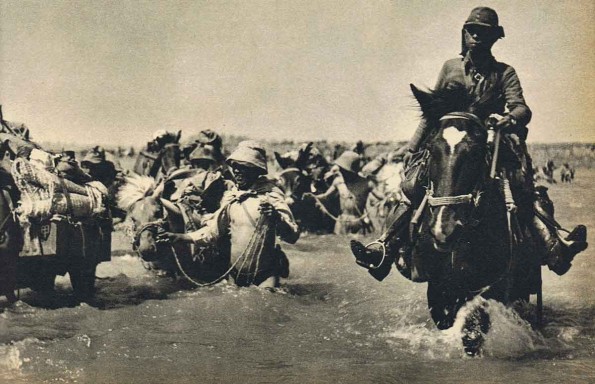Tuesday 7 May 1940
 |
| Leo S. Amery makes a memorable comment in the House of Commons. |
Leo S. Amery, a low-profile backbencher, cries out a quote from Oliver Cromwell:
“Somehow or other we must get into the Government men who can match our enemies in fighting spirit, in daring, in resolution and in thirst for victory.... I will quote certain other words. I do it with great reluctance, because I am speaking of those who are old friends and associates of mine, but they are words which, I think, are applicable to the present situation. This is what Cromwell said to the Long Parliament when he thought it was no longer fit to conduct the affairs of the nation: 'You have sat too long here for any good you have been doing. Depart, I say, and let us have done with you. In the name of God, go!'”The final vote is scheduled for the morrow.
Norway Army Operations: The Norwegian 6th Division tries to block the German 2nd Mountain Division relief column rushing to help General Dietl's regiment at Narvik. Essentially, the Allies have Narvik surrounded, and all they have to do to take the town is to block that one relief attempt.
Norway Air Operations: The Luftwaffe hits British cruiser HMS Aurora at 16:41, putting turrets A and B out of action and killing 7 Marines.
Norway Naval Operations: More Allied troops land in northern Norway for the Narvik operation. This time, some 5,000 Polish troops, the Polish Podhale Brigade (Chasseurs du Nord), arrive in Harstad.
Battle of the Atlantic: A Bristol Beaufort torpedo bomber of RAF Coastal Command drops a 2,000lb bomb at a German cruiser spotted in the East Frisian islands. It misses but marks a first as the largest bomb dropped by the RAF (the Luftwaffe previously dropped a bomb that was twice as large on the Hegra Fortress in Norway).
A gun accident on WWI-era British cruiser HMS Curlew kills five sailors.
Convoy HG 29 departs from Gibraltar.
Western Front: Allied aerial reconnaissance is beginning to detect signs of the Wehrmacht build-up, but reports are haphazard. A French pilot returning from a leaflet raid on Düsseldorf happens to see a 60-mile-long German motorized column heading toward the Ardennes.
General Charles Huntziger, commanding French 2nd Army in the Sedan sector, states: "I do not expect that the Germans will ever consider attacking in the region of Sedan."
Hitler moves the start date to 9 May 1940 due to the weather. General Jodl notes that "Hitler is greatly agitated."
Soviet Military: Stalin implements a major shake-up of the military high command. Semyon Timoshenko, fresh off what is considered a brilliant and successful re-direction of the Winter War, replaces Kliment Voroshilov as the Soviet Union's Minister of Defence. Voroshilov is being demoted to Deputy People's Commissar of Defense due to the failures in Finland. Chief of General Staff Boris Shaposhnikov is promoted to Marshal of the Soviet Union.
Holland: Responding to fragmentary reports of German troop movements and various clandestine sources such as the Vatican, the government cancels all leaves, mobilizes the reserve and begins strengthening/occupying its frontier and coastal defenses.
The Dutch have various sources of information about Fall Gelb that the Allies do not. However, they are under no obligation to disclose this information, and they don't. As Dutch civil servant Snouck Hurgronje says, "They're not our Allies."
US Navy: President Roosevelt cuts short a vacation due to what he describes as a "case of nerves." He is concerned about the situation vis-à-vis Japan. The US fleet is scheduled to return from Hawaii to the west coast of the United States on 9 May, but he believes this would encourage Japanese intransigence. He instructs Rear Admiral James O. Richardson to issue a press release stating that the US fleet would remain in Hawaii indefinitely and that it had been done at his request.
China: At the Battle of Tsaoyang-Ichang, the Japanese 11th Army captures Suiyangtien, Wuchiatien, and Tangho and attacks Shuangkou.
 |
| Soldiers of the Imperial Japanese Army 6th Infantry Regiment crossing the Bái hé River during the Battle of Zaoyang-Yichang. |
May 1940
May 1, 1940: British Leave ÅndalsnesMay 2, 1940: British Depart Namsos
May 3, 1940: Many Norwegians Surrendering
May 4, 1940: Bader Returns
May 5, 1940: HMS Seal Survives
May 6, 1940: Allies Focus on Narvik
May 7, 1940: In The Name of God, Go!
May 8, 1940: Exit Chamberlain
May 9, 1940: Enter Churchill
May 10, 1940: Fall Gelb
May 11, 1940: Eben Emael Surrenders
May 12, 1940: Germans at Sedan
May 13, 1940: Rommel at Work
May 14, 1940: German Breakout in France
May 15, 1940: Holland Surrenders
May 16, 1940: Dash to the Channel
May 17, 1940: Germans Take Brussels
May 18, 1940: Germans Take Antwerp
May 19, 1940: Failed French Counterattack
May 20, 1940: Panzers on the Coast
May 21, 1940: Battle of Arras
May 22, 1940: Attacking Channel Ports
May 23, 1940: British Evacuate Boulogne
May 24, 1940: Hitler's Stop Order
May 25, 1940: Belgian Defenses Creaking
May 26, 1940: Operation Dynamo
May 27, 1940: King Leopold Surrenders
May 28, 1940: The Allies Take Narvik
May 29, 1940: Lille Falls
May 30, 1940: Operation Fish
May 31, 1940: Peak Day for Dynamo
2019
No comments:
Post a Comment